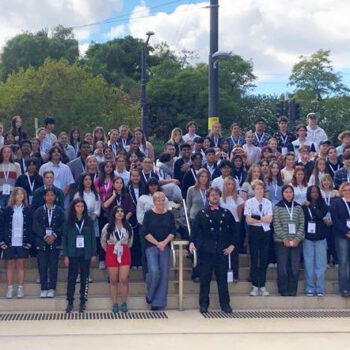South Australia’s Commissioner for Children and Young People, Helen Connolly, hosted the first face to face meeting of the newly established South Australian Student Representative Council (SA SRC) on Friday 13 May at the Adelaide Festival Centre. The Commissioner selected 166 students from over 240 applications with approximately 150 travelling to attend the inaugural SA SRC Summit where council members met each other for the first time.
SA SRC was developed via a partnership between CCYP and Foundation for Young Australians (FYA), supported by the National Indigenous Youth Education Coalition (NIYEC). All those in attendance participated in a series of workshops on storytelling and how to identify community issues and actions that will address them. As well as, examining case study examples of young people’s actions that have helped to bring about real change such as Act Up for Aids, the School Strike for Climate and Black Lives Matter campaigns.
During the SA SRC summit, students also had an opportunity to hear from members of parliament with many meeting their local MP for the first time. They not only had opportunities to share their opinions on a range of topics with these key decision makers but also gained a better understanding of how decisions are made. Students learned first-hand how to critically engage with decision makers to resolve issues young people feel matter most.
Students delved into issues in their own communities, identifying both areas of concern and of opportunity. Often many students feel their opinions and solutions to problems are not taken seriously and want more ways to share their ideas and opinions when decisions that affect them are being made.
Equality and inclusion issues were on the radar for students who say stereotyping, a lack of awareness and acceptance, and minimal representation had negative impacts on members of LGBTQIA+ communities, people living with disability and Indigenous peoples and their culture.
Students raised issues and concerns young people have identified in their own communities including youth voice, equality and inclusion, environment and transport, wellbeing and education reform. Many identified transport and transport infrastructure as one of the areas in which there was a clear need for greater investment with safer crossings to school, improved accessibility, increased availability and reliability all identified as desirable outcomes.
Environmental concerns worried many students with inaction on climate change, the reduction of waste, low investment into renewables, and protecting native flora and fauna from extinction. Although many students viewed climate change as an issue of global importance, they also believe that action must begin at the local level. Young people want decision makers to take climate change seriously and felt their voices and frustrations with inaction were not being heard or addressed.
Although there has been more attention placed on mental health in recent years, students still felt that there is a lack of support, funding, awareness and understanding surrounding mental illnesses. Many echoed the view that there is an invisibility of people with disability, not enough to help those being mentally abused, limited ability to access mental health services in a timely manner and that these issues are still not being adequately addressed. Many students in regional areas felt that a lack of psychologists, and limited access to services had negative impacts on their communities.
Frustration at educational institutions for not modernising their policies and practicing student-led and informed curriculums were common. Many were concerned for LGBTQIA+ communities who lacked inclusive health education and acceptance in schools. Others had issues with the curriculum being designed around topics that students felt irrelevant or of less importance than ‘life skills’ like financial literacy, how the tax system works and proper health and nutrition education.
What’s next for the SA SRC? Students will now meet again in workshops to develop their skills and refine how they can make positive change in their communities. While some connected directly with their local members of parliament, students will also begin group formation to take action on more specific areas they want to see change.
For more information and to keep up to date on the SA SRC here.


























